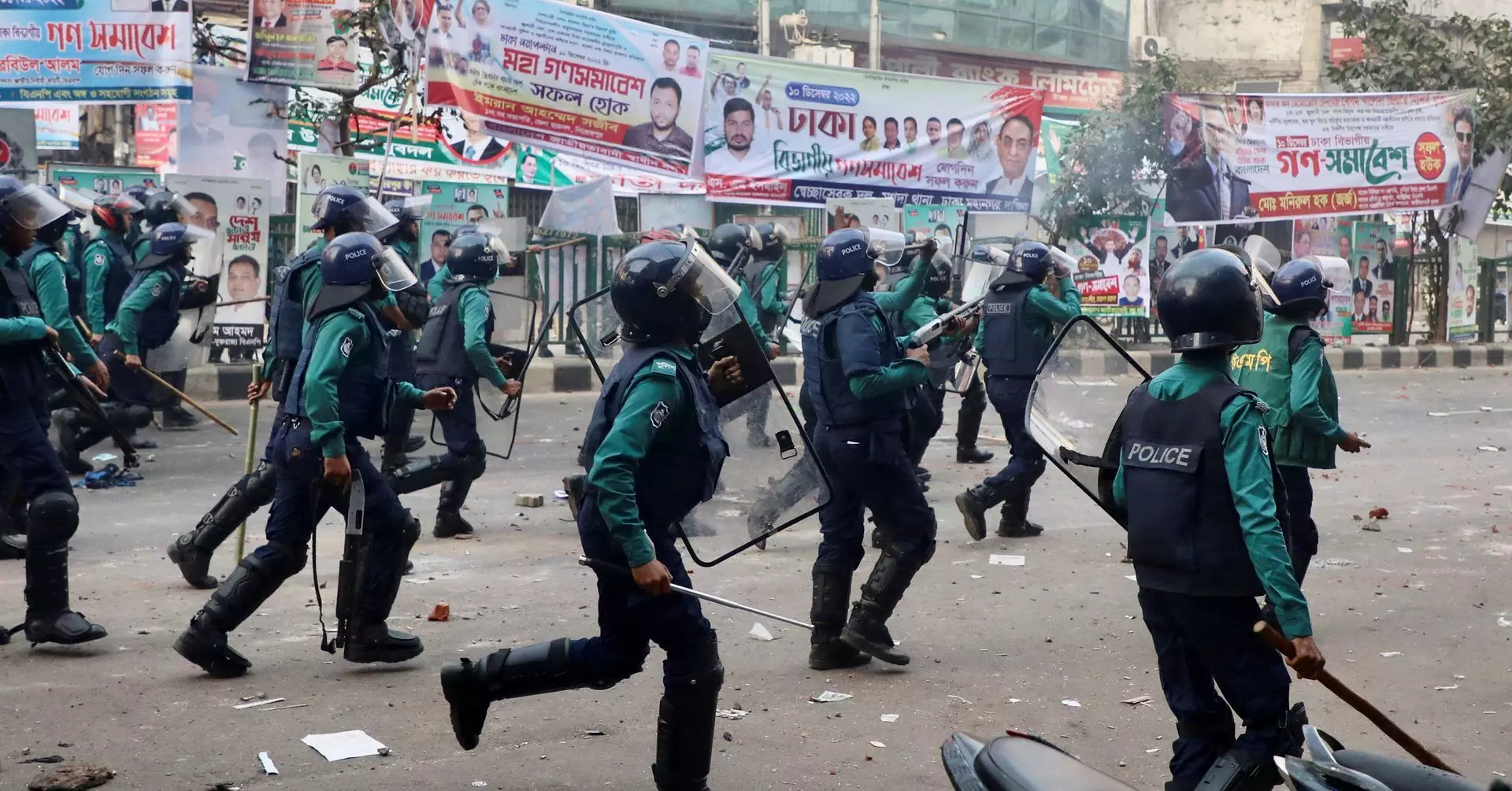Hectic politicking
Hasina-led pro-India Awami League government should astutely respond to the intimidating rise of the BNP and other pro-Pakistan parties

Bangladesh is steadily getting embroiled into hectic political activity in the run up to the general elections scheduled next year. The 51-year-old nation is not new to politics, as it was born out of a nationalist fervour having surfaced after a bloody liberation struggle lasting nearly a year. Preceding it's coming into existence, it had seen vibrant rhetoric of its founding father, Sheikh Mujibur Rahman, and the proud nation springing to a historic upheaval, challenging the brute of the Pakistan military and the Punjabi-Sindhi discriminatory domination which could not withstand the Bengali streak of nationalism. Eventually, Pakistan was dismembered, rejecting the infamous two-nation theory floated by Jinnah and his adherents, which was a turning point in the history of the Indian subcontinent.
Earlier, during the Pakistani reign (1947-1971), Bengali politics never allowed any space to the aggressive designs of West Pakistan's imposition of Urdu replacing Bangla as the language. The 1952 language movement in the first five years of the existence of Pakistan had spurred a fierce anti-West Pakistani feeling, with the Bengali people revolting against the unfair domination. Bengali politics had prevailed over the successive dictatorial regimes and the might of the military. Again, it was the leadership of the Bengali leaders like AK Fazlul Huq, HS Suhrawardy and their affiliates, which helped give momentum to the creation of Pakistan in the partition days. Conversely, it's the politics which remained on top of Bangla nationalism, and it remains so today.
Against this historical backdrop, today, when the parliamentary elections are poised for 2023, the political heat stands turned on, with the incumbent party — the Awami League (AL) — under Prime Minister Sheikh Hasina facing head on political challenges from its adversary Bangladesh Nationalist Party (BNP) and other Islamic fundamentalist parties. Hasina perhaps is complacent being 'firmly' in the saddle since 2009 with a notion of political invincibility. Taking advantage of this, BNP seems to be usurping enough political space, as evident from the recent public meetings and rallies where the political opponents have stepped up their tirade against Hasina. It would also seem that political campaigning is gaining more momentum, as the acerbic rhetoric targeting Hasina apparently aims to dislodge her from power.
On her part, Prime Minister Hasina may possibly be under pressure from the global community to show that democracy is alive and kicking in Bangladesh. However, that's proving costly for her as, starting from smaller protest meetings, BNP has managed to draw larger crowds protesting against the AL government. This was visible in a fairly large and well-mobilized gathering by the BNP at Dhaka on December 10. BNP's demand of holding elections under a neutral caretaker government is also getting enough fuel through mobilization of such a large number of people. This platform has seen a very dynamic revival of the inert BNP which of course is detrimental to Hasina's political interests. This all is happening when BNP's top leader Khaleda Zia is afflicted with ill health, and her son Tariq Rahman is in London. Both are facing serious charges for several criminal offences. Tariq, suspected of being sheltered and funded by the Pakistani ISI, is even slapped with charge of conspiring to kill Hasina.
Knowledgeable sources, meanwhile, do not rule out a proactive role by some other western intelligence agencies in extending all-out support to the BNP, which is manifesting into a full-scale agitation. The BNP also held protest rallies in places other than Dhaka — in Chittagong, Rajshahi, Mymensingh, Khulna, Rangpur, Faridpur, Sylhet and Camilla. This means there is a clear trend of creating an anti-Hasina public opinion. Hasina and the AL need to arrest this trend sooner. BNP's principal demand of holding elections under a neutral caretaker government seems to gain traction. It's becoming increasingly clear that there are external forces that are scripting these agendas for the BNP to try and topple Hasina who is pro-India, secular and protector of the minorities. The BNP, on the other hand, is known for its pro-Pakistan stance, as also for its direct connections with Islamic countries that are supporters of fanatics and encourage radical Islam in Bangladesh.
We have seen under the BNP rule in the past how Indian Northeast insurgents and anti-Indian lobbies received support from the Khaleda-led government, including sheltering serious offenders of crime. More worrisome was their partnership with Jamat and affiliates who formed part of the killer squads eliminating the freedom fighters and pro-India elements. Same BNP is now trying to flex its muscles in pinning down Hasina and her party. Time for the next elections is short, and Hasina must display her political astuteness and sharp instincts to counter the BNP and its support groups now. It's in the Indian interests, too. Bangladesh, being a strategically placed country, is being wooed by China and Turkey and, significantly, both these countries, like Pakistan, are not at all favourably disposed towards India. Indian hawks must be watching this, and they need to preempt any move that may enable BNP or the religious extremists to get the better of Hasina. That's the key to regional peace as well as in the larger interests of India.
The writer is a retired IPS officer, a security analyst and a former National Security Advisor to the PM of Mauritius. Views expressed are personal



